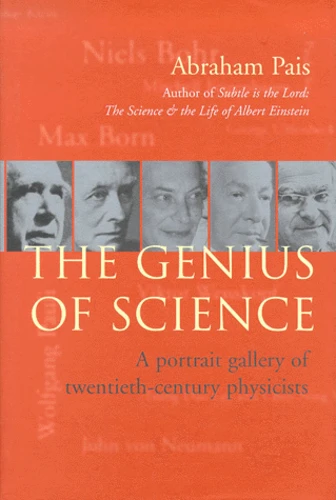The Genius Of Science. A Portrait Gallery Of Twentieth - Century Physicists
Par :Formats :
Définitivement indisponible
Cet article ne peut plus être commandé sur notre site (ouvrage épuisé ou plus commercialisé). Il se peut néanmoins que l'éditeur imprime une nouvelle édition de cet ouvrage à l'avenir. Nous vous invitons donc à revenir périodiquement sur notre site.
- Nombre de pages356
- PrésentationRelié
- Poids0.745 kg
- Dimensions16,1 cm × 24,0 cm × 2,3 cm
- ISBN0-19-850614-7
- EAN9780198506140
- Date de parution06/03/2000
- ÉditeurOxford University Press
Résumé
'Bram Pais is well known and respected in the world of theoretical physics, and acclaimed by a wider public for his biographies of Albert Einstein and Niels Bohr. He has known and worked with almost everyone who contributed to the twentieth century's great revolution in which the mysteries of the atom and its fundamental constituents were revealed and reduced to some sort of order.
In this book he recalls the life and achievements of some of his old friends, to give us a convincing impression of intellectual distinction allied to warm, if occasionally eccentric, humanity. These are real people, not the caricature scientists of comic books and films; I knew some of them myself, and find Bram's picture of them wholly convincing.'
Sir Brian Pippard, FRS
Abraham Pais is the acclaimed author of the definitive biographies of Albert Einstein and Niels Bohr, two of the twentieth century's greatest scientists. As a distinguished theoretical physicist himself, he was also acquainted with many of the other great scientists.
In this new book, Pais turns his attention to seventeen other scientists, all distinguished in their own right, but who had appeared as the supporting cast to his previous biographies. We meet, among others, the famously taciturn Paul Dirac;
Max Born, who coined the term 'quantum mechanics'; Wolfgang Pauli, famed for his exclusion principle and known as the conscience of twentieth-century physics; Mitchell Feigenbaum, inventor of chaos theory; and John von Neumann, one of the most influential mathematicians of the century. In addition, and because their work is so relevant to the others discussed, Pais has included chapters on Einstein and Bohr, giving the essence of their character and scientific achievement.
In each case, Pais presents a blend of the personality and achievements of the scientist, assisted by his deep knowledge of physics and his personal acquaintance with the subject. The result is a unique and illuminating collection of portraits that shed light on both the personalities and the development of science of this group of great scientists. It will be read by all those with an interest in the development of science in the twentieth century, from relativity to chaos theory.
'Bram Pais is well known and respected in the world of theoretical physics, and acclaimed by a wider public for his biographies of Albert Einstein and Niels Bohr. He has known and worked with almost everyone who contributed to the twentieth century's great revolution in which the mysteries of the atom and its fundamental constituents were revealed and reduced to some sort of order.
In this book he recalls the life and achievements of some of his old friends, to give us a convincing impression of intellectual distinction allied to warm, if occasionally eccentric, humanity. These are real people, not the caricature scientists of comic books and films; I knew some of them myself, and find Bram's picture of them wholly convincing.'
Sir Brian Pippard, FRS
Abraham Pais is the acclaimed author of the definitive biographies of Albert Einstein and Niels Bohr, two of the twentieth century's greatest scientists. As a distinguished theoretical physicist himself, he was also acquainted with many of the other great scientists.
In this new book, Pais turns his attention to seventeen other scientists, all distinguished in their own right, but who had appeared as the supporting cast to his previous biographies. We meet, among others, the famously taciturn Paul Dirac;
Max Born, who coined the term 'quantum mechanics'; Wolfgang Pauli, famed for his exclusion principle and known as the conscience of twentieth-century physics; Mitchell Feigenbaum, inventor of chaos theory; and John von Neumann, one of the most influential mathematicians of the century. In addition, and because their work is so relevant to the others discussed, Pais has included chapters on Einstein and Bohr, giving the essence of their character and scientific achievement.
In each case, Pais presents a blend of the personality and achievements of the scientist, assisted by his deep knowledge of physics and his personal acquaintance with the subject. The result is a unique and illuminating collection of portraits that shed light on both the personalities and the development of science of this group of great scientists. It will be read by all those with an interest in the development of science in the twentieth century, from relativity to chaos theory.


